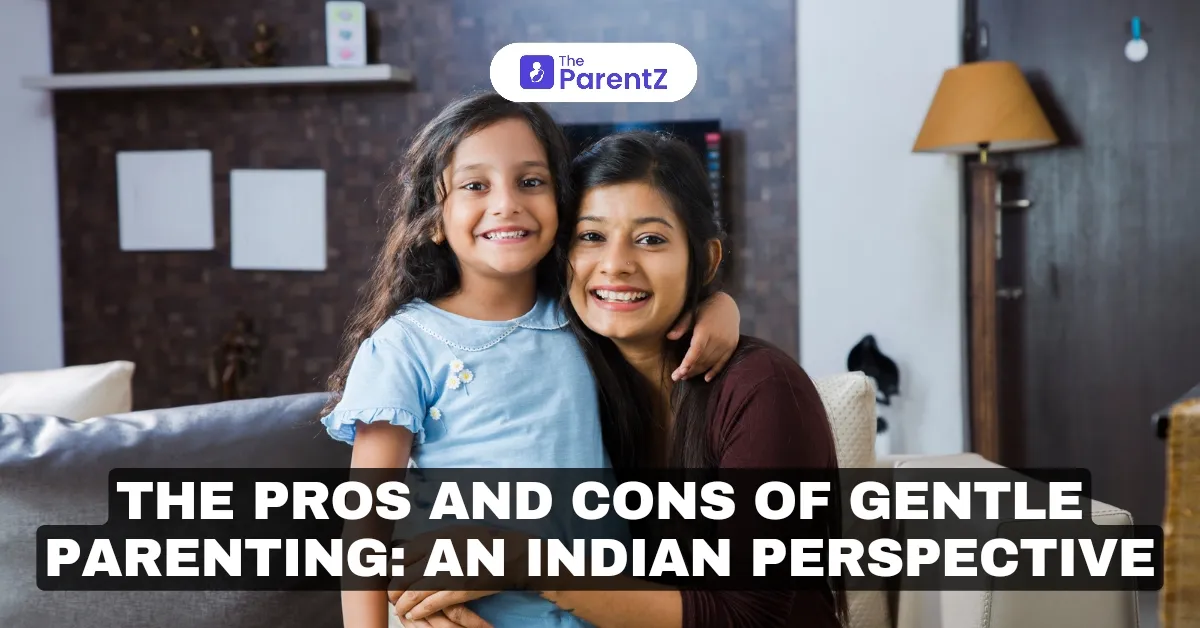Gentle parenting has become a topic of interest among Indian parents seeking a nurturing and respectful approach to raising their children. Rooted in empathy, understanding, and positive discipline, gentle parenting has its unique advantages and challenges, especially in the Indian cultural context. This article explores the pros and cons of gentle parenting with Indian case studies, offering a deeper understanding of how this approach plays out in real-life situations.
What is Gentle Parenting?
Gentle parenting emphasizes empathy, respect, understanding, and setting boundaries without punishment or rewards. It aims to raise emotionally intelligent, secure, and self-disciplined individuals.
The Pros of Gentle Parenting
1. Fosters Emotional Intelligence
Case Study: Rekha, a mother from Delhi, noticed that her son, Aarav, often struggled to express his emotions, leading to frequent outbursts. Instead of scolding him, Rekha began sitting with Aarav, acknowledging his feelings, and helping him find words to express himself. Over time, Aarav started articulating his emotions better, leading to fewer meltdowns and more peaceful interactions at home.
Why it’s a Pro: In a society where emotional expression is often downplayed, gentle parenting encourages children to understand and express their feelings. This approach helps in developing emotional intelligence, which is crucial for building healthy relationships and navigating life's challenges.
2. Builds Strong Parent-Child Relationships
Case Study: Priya and Raj, a couple from Mumbai, were initially skeptical about gentle parenting. However, after adopting this approach, they noticed that their daughter, Aisha, began sharing more about her school life and friendships. Instead of fearing punishment, Aisha felt safe discussing her mistakes, knowing her parents would listen without judgment.
Why it’s a Pro: The strong bond between parent and child, emphasized in gentle parenting, fosters open communication, trust, and mutual respect. In a culture where authority figures are often feared, gentle parenting helps children feel valued and understood.
3. Encourages Independence and Responsibility
Case Study: Suman, a single mother from Bangalore, allowed her son, Rohan, to make decisions about his daily routine, from choosing his clothes to deciding how to spend his free time. By guiding Rohan rather than dictating his choices, Suman saw him develop a strong sense of responsibility and independence at a young age.
Why it’s a Pro: In an environment where children are often expected to follow parental instructions without question, gentle parenting empowers them to make decisions. This fosters independence, self-confidence, and a sense of responsibility, which are essential life skills.
The Cons of Gentle Parenting
1. Risk of Over-Leniency
Case Study: Anjali, a mother from Chennai, struggled to set firm boundaries with her daughter, Meera. In her attempt to be gentle, Anjali often gave in to Meera's demands to avoid conflict. This led to Meera becoming increasingly demanding, testing Anjali's limits, and expecting to always get her way.
Why it’s a Con: Without clear boundaries, children may not learn the consequences of their actions, leading to issues with discipline and respect. In a culture where respect for elders is paramount, gentle parenting requires a delicate balance between kindness and firmness.
2. Time-Consuming and Emotionally Draining
Case Study: After a long day at work, Rohit, a father from Hyderabad, found it challenging to remain patient when his son, Aditya, refused to study. Gentle parenting required Rohit to stay calm and talk through Aditya’s resistance, often leaving him emotionally drained and exhausted.
Why it’s a Con: Gentle parenting can be demanding, requiring patience, consistency, and emotional energy. For working parents juggling multiple responsibilities, this approach may feel overwhelming and unsustainable at times.
3. Cultural Misalignment and Misinterpretation
Case Study: Vinita from Jaipur noticed that her son, Vikram, began taking advantage of the gentle approach. Vikram started pushing boundaries, thinking there would be no real consequences for his actions. Vinita had to re-evaluate her approach, ensuring that while she remained empathetic, Vikram understood that certain behaviors were unacceptable.
Why it’s a Con: In a culture where strict discipline is often seen as necessary, children might misinterpret gentle parenting as permissiveness if not balanced with clear expectations. Parents need to ensure that their children understand the difference between kindness and leniency.
Finding the Balance: Tips for Successful Gentle Parenting in India
- Set Clear Boundaries: Gentle parenting doesn’t mean letting go of rules. Set clear, consistent boundaries, and ensure your child understands the consequences of their actions.
- Be Consistent: Consistency is key in any parenting style. Make sure your responses are predictable, helping your child feel secure and understand what is expected of them.
- Practice Self-Care: Parenting is demanding, and gentle parenting can sometimes feel even more so. Ensure you take time for self-care to recharge emotionally and physically.
- Communicate Effectively: Use age-appropriate language to communicate with your child. Encourage them to express their feelings and thoughts, and actively listen to what they have to say.
Conclusion
Gentle parenting offers numerous benefits, including fostering emotional intelligence, building strong parent-child relationships, and encouraging independence in children. However, it also presents challenges, such as the risk of leniency, the emotional demands on parents, and the need for clear communication and cultural alignment. By finding a balance and staying mindful of both the pros and cons, Indian parents can successfully implement gentle parenting techniques that work best for their families.
In a diverse and culturally rich country like India, where traditional values often intersect with modern parenting approaches, gentle parenting can be adapted to suit individual family dynamics. Every child and family is unique, so it’s essential to adjust your parenting style as needed to meet your child’s needs while maintaining your own well-being.








Be the first one to comment on this story.